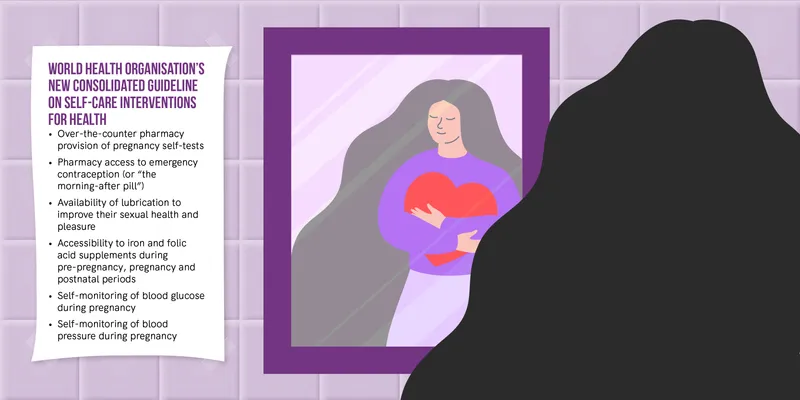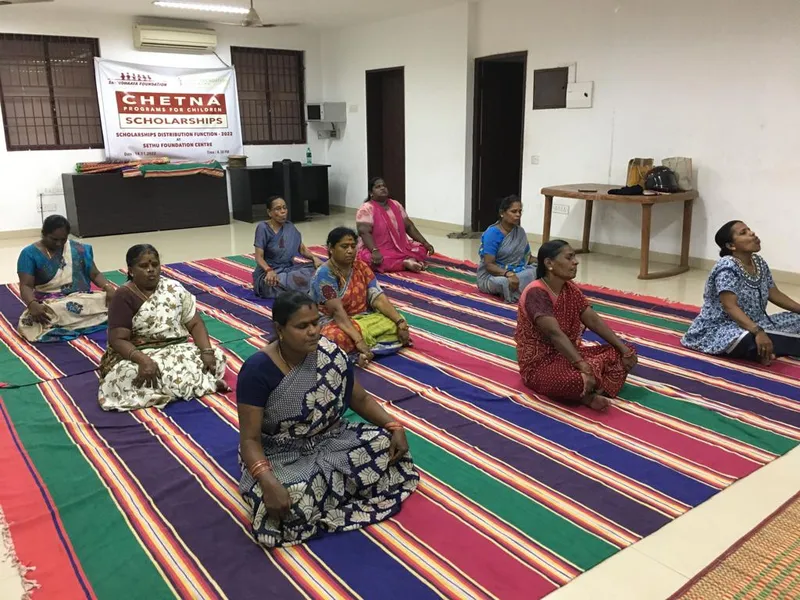Women are battling a self-care deficit, but there are ways to change this
When compared with married men, Indian women spend 82 minutes fewer on themselves in a day. However, there are ways to address this longstanding problem, say experts.
Prema C, a retired government employee from Chennai, is turning 80 this year. She and her husband got married when they were in their early 40s and had a late child, a daughter who is now in her 30s.
In her youth, Prema survived a severe episode of tuberculosis and by the time she hit 60, she weighed less than 40 kg. In looks and spirit, she feels older than her husband, who is an octogenarian himself. While her brothers and husband have regular checkups, her last master health checkup was eight years ago.
“What is ironic is that for someone who does the most work in this family—voluntarily—she is the least cared for,” says her daughter and media professional Shenba. “No woman in my family is comfortable spending money on a health checkup. They are always cautious that it would become an undue expense or a burden on the family,” she tells HerStory.
Shenba is the first woman in her family to opt for self-care. She has joined yoga and therapy, and has cultivated an interest in badminton and running.
“These activities may seem like a normal part of a 30-something city dweller’s life. But in my family, this is a herculean challenge, considering the way women have been perceived and have perceived themselves—as the last-rung members of the household; they have the least to eat after everyone else has eaten, are the last ones to sleep, and the first to wake up, and absolutely never ask for more than what they are given,” says Shenba.
Shenba allotted time and resources for self-care only after she turned 30 and had developed hypertension, inherited from her mother and grandmother, and Sciatica—a condition wherein pain travels along the sciatic nerve, from the lower back down each leg.
Self-care includes sleep, eating and drinking, personal hygiene and care; receiving care from others through activities such as visiting a clinic, salon or a therapist. They also include leisure—attending events, participating in hobbies and sports, reading, watching TV, as well as social and spiritual care such as meeting friends and private prayer.
In a recent survey, India Spend found that when compared to married men, Indian women spend 82 fewer minutes on average on themselves in a day. Also, Indian women on average spend 85 hours doing unpaid domestic work and caregiving activities as opposed to men who spend just over five hours a week on these.
“We’ve subconsciously learned from our mothers and grandmothers that one, it is expected of them to carry out all the domestic and care duties in the house, and two, if the women in their family line have generationally endured long-term neglect, the mothers and grandmothers of this family live with a strong survivor’s guilt that keeps them from doing anything for their own wellness,” says Deepti Khemchandani, a Mumbai-based trauma-informed therapist and psychologist.
In Prema’s family, for instance, the men have always outlived the women. The women have developed hypertension due to prolonged anxiety and caregiver stress, anaemia due to poor nutrition, and chronic osteoporosis due to a severe lack of calcium and laborious household work. This included carrying bucket loads of laundry, travelling 6-7 kilometres on foot every day, and standing in the kitchen from morning to night.
Her family also has a higher birth rate. Mothers have a minimum of four and a maximum of eight children, and receive negligible nutrition and rest to support their bodies through the gestational period and pregnancy. This has led to children being born with deficiencies and some even dying prematurely.
While Prema lived a far better life than her ancestors, she carries the same effects of poor care and stress in her body nevertheless. It is inherited through 'intergenerational transmission'— stress passed onto the offspring via gametes (reproductive cells), the uterine environment during the pregnancy period, and early postnatal care. These stressors are reflected in the offspring through biological changes related to the brain and nervous system.
Shenba has managed to break out of this cycle in several ways since she made self-care a priority. She not only manages the household financially but has a healthy circle of friends and a mental health community; is able to work better; has a steady and equal relationship with her partner; and is working on several fitness goals.
“While I’ve had to fight very hard for these things in my family, every bit of that effort has paid off as I find myself living life in ways no woman in my family has,” she says.

Neglect is cultural
While working with rural, tribal, women and children in Gadchiroli in Maharashtra in the 1980s, doctors and founder-directors of the Society for Education, Action and Research in Community Health (SEARCH) found that 92% of the women suffered from some or the other gynaecological or sexual disease and only 8% had received treatment of any kind for them.
There were other concerns too, such as menstrual problems, reproductive tract infections, sexually transmitted diseases, and others, Dr Rani said in an interview with NDTV.
She realised how deeply cultural the problem was when she realised that in the village, it was more accepted for a woman to die of obstructed labour than have infertility, which then would lead to a lifetime of blame and shame.
Citing the 2012 Indian Human Development Survey conducted by the University of Maryland and the National Council of Applied Economic Research, India Spend’s study noted that 80% of women need to seek permission from a family to visit a primary health centre. It adds that Arunachal Pradesh had the highest self-care gap (151 minutes) while Haryana had the lowest (49 minutes).
Putting yourself first
To tackle the longstanding issue that is cultural, psychological and patriarchal, Sethu Foundation, a Chennai-based non-profit working to create economic opportunities for urban slum women, has made it mandatory for them to learn yoga as part of the programme.

Chennai 's Sethu Foundation conducts weekly yoga and meditation sessions for urban slum women.
“We have classes once a week, and tie them up with other mental health workshops and skill training so that our women don’t miss it. We realised that women—even those who live in households where alcoholism, abuse, neglect and single parenting are the norm—want to prioritise financial independence,” says Sethulakshmi CJ, Managing Director of Sethu Foundation, who also opened a drop-in centre recently where the women they work with can rest, replenish and go on with their day.
“When we curate our programmes in a way that these women must take the time out for their physical and mental wellness, we also make them realise that this is an important part of breaking the cycle of poverty and neglect—for themselves and therefore for their daughters and granddaughters. And because it’s helping them become healthier breadwinners, their families are able to see the value in this too,” she says.
(Feature image and infographics by Nihar Apte)
Edited by Kanishk Singh







